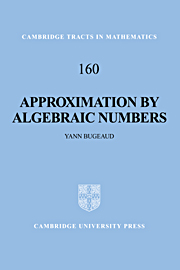Book contents
- Frontmatter
- Contents
- Preface
- Frequently used notation
- 1 Approximation by rational numbers
- 2 Approximation to algebraic numbers
- 3 The classifications of Mahler and Koksma
- 4 Mahler's Conjecture on S-numbers
- 5 Hausdorff dimension of exceptional sets
- 6 Deeper results on the measure of exceptional sets
- 7 On T-numbers and U-numbers
- 8 Other classifications of real and complex numbers
- 9 Approximation in other fields
- 10 Conjectures and open questions
- Appendix A Lemmas on polynomials
- Appendix B Geometry of numbers
- References
- Index
5 - Hausdorff dimension of exceptional sets
Published online by Cambridge University Press: 12 August 2009
- Frontmatter
- Contents
- Preface
- Frequently used notation
- 1 Approximation by rational numbers
- 2 Approximation to algebraic numbers
- 3 The classifications of Mahler and Koksma
- 4 Mahler's Conjecture on S-numbers
- 5 Hausdorff dimension of exceptional sets
- 6 Deeper results on the measure of exceptional sets
- 7 On T-numbers and U-numbers
- 8 Other classifications of real and complex numbers
- 9 Approximation in other fields
- 10 Conjectures and open questions
- Appendix A Lemmas on polynomials
- Appendix B Geometry of numbers
- References
- Index
Summary
In the preceding Chapters, we have encountered several sets of real numbers of Lebesgue measure zero, including the set of Liouville numbers, the set of real numbers with bounded partial quotients, the set of very well approximable numbers, and the set of S*-numbers of *-type strictly greater than 1. Some of them are certainly strictly larger than others: indeed, as it may be seen by considering continued fraction expansions (see Exercise 1.5), there are very well approximable numbers other than the Liouville numbers. On the other hand, the set of S*-numbers of *-type at least 2 contains the set of S*-numbers of *-type at least 3, but the results of Chapters 1 to 4 do not enable us to decide whether the inclusion is strict or not.
In the present Chapter, we introduce a powerful tool for discriminating between the sets of Lebesgue measure zero, namely the notion of Hausdorff dimension, developed by Hausdorff in 1919 [276]. Shortly thereafter, Jarník [288, 292] and, independently, Besicovitch [100], applied it to number theoretical problems, and they determined the Hausdorff dimension of sets of real numbers very close to infinitely many rational numbers (Theorem 5.2). Their result has been subsequently generalized in many directions. For instance, A. Baker and Schmidt [45] showed in 1970 that there exist S*-numbers of arbitrarily large but finite *-type (Theorem 5.5). In the present Chapter, we prove both these results and we quote some other extensions of the Jarník–Besicovitch Theorem. Further refinements are stated in Chapter 6.
- Type
- Chapter
- Information
- Approximation by Algebraic Numbers , pp. 90 - 121Publisher: Cambridge University PressPrint publication year: 2004

